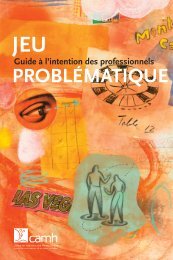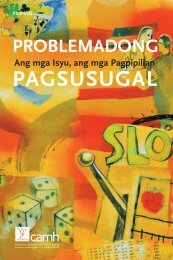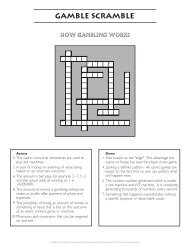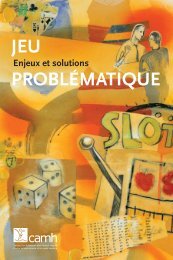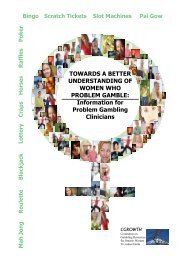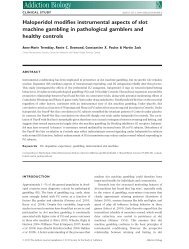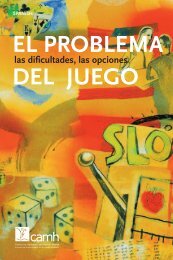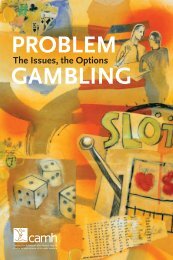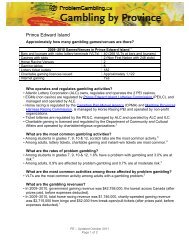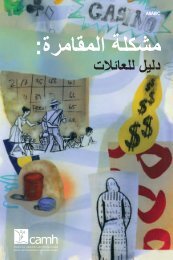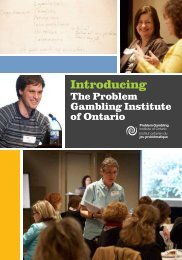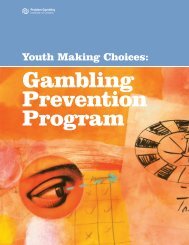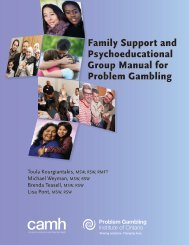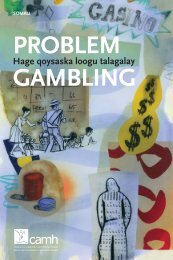Probability, Random Events, and the Mathematics of Gambling
Probability, Random Events, and the Mathematics of Gambling
Probability, Random Events, and the Mathematics of Gambling
Create successful ePaper yourself
Turn your PDF publications into a flip-book with our unique Google optimized e-Paper software.
produces a very slow accumulation <strong>of</strong> money. Eventually, however, <strong>the</strong> player experiences a<br />
disastrous losing streak<br />
One final reason for errors in judging r<strong>and</strong>om events is that our minds tend to segment events<br />
in ways that are consistent with what we expect. Given a heads <strong>and</strong> tails sequence <strong>of</strong> H, H, H,<br />
H, T, H, H, H, T, T, T, T, H, we are likely to divide this string into a segment in which H was<br />
more likely to appear (H, H, H, H, T, H, H, H) <strong>and</strong> one in which T was more likely to appear<br />
(T, T, T, T, H). This segmentation process is very <strong>of</strong>ten used by sports commentators (e.g.,<br />
“The Blue Jays have now won 5 <strong>of</strong> <strong>the</strong>ir last 6 games,” or “A player has struck out 11 times in<br />
his last 15 at bat”). In segmenting <strong>the</strong> sequence this way, it is very easy to convince oneself<br />
that tails did in fact come up more <strong>of</strong>ten, to correct for <strong>the</strong> excess <strong>of</strong> heads. As noted above,<br />
our minds are predisposed to find patterns, not to discount <strong>the</strong>m.<br />
Summary<br />
There are important clues regarding erroneous beliefs in <strong>the</strong> experiences <strong>of</strong> <strong>the</strong> individual who<br />
gambles. While it is unlikely that addressing <strong>the</strong> erroneous beliefs is sufficient for treatment,<br />
exploring <strong>the</strong>se beliefs can be an important aid in helping <strong>the</strong> client underst<strong>and</strong> <strong>the</strong>ir gambling<br />
experiences—both <strong>the</strong>ir wins <strong>and</strong> <strong>the</strong>ir losses. Correcting <strong>the</strong>se beliefs may also help in<br />
relapse prevention. If individuals with a gambling problem still believe that <strong>the</strong>y can beat <strong>the</strong><br />
odds, <strong>the</strong> odds are <strong>the</strong>y will try again.<br />
References<br />
Arnold, P. (1978). The encyclopedia <strong>of</strong> gambling: The games, <strong>the</strong> odds, <strong>the</strong> techniques, <strong>the</strong><br />
people <strong>and</strong> places, <strong>the</strong> myths <strong>and</strong> history. Glasgow: Collins Publishers.<br />
Bass, T.A. (1985). The eudaemonic pie. Boston: Houghton Mifflin Company.<br />
De Finetti, B. (1990). Theory <strong>of</strong> probability: A critical introductory treatment (Vol. 1).<br />
(Trans. A. Machi & A. Smith.) Chichester: Wiley.<br />
Gabriel, K. (2003). Playing <strong>the</strong> gods. <strong>Gambling</strong> <strong>and</strong> spirituality: A new anthropological<br />
perspective. In G. Reith (Ed.), <strong>Gambling</strong>: Who wins? Who loses (pp. 334–347).<br />
Amherst, NY: Prome<strong>the</strong>us Books.<br />
22



